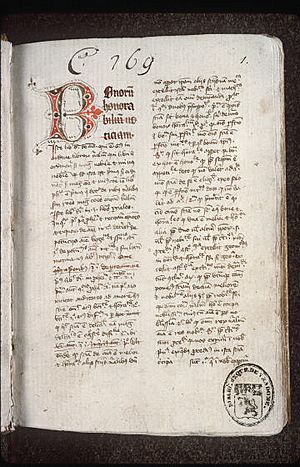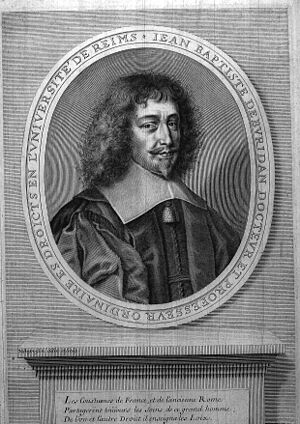Jean Buridan facts for kids
Quick facts for kids
Jean Buridan
|
|
|---|---|
| Born | c. 1301 |
| Died | c. 1359 – c. 1362 |
| Alma mater |
|
| Era | Medieval philosophy |
| Region | Western philosophy |
| School |
|
| Institutions | University of Paris |
|
Main interests
|
|
|
Notable ideas
|
|
|
Influences
|
|
|
Influenced
|
|
Jean Buridan (born around 1301 – died around 1359 or 1362) was an important French thinker. He was a philosopher who lived in the 14th century.
Buridan taught at the University of Paris for his whole career. He mostly studied logic and the ideas of Aristotle. Buridan helped start new ways of thinking that later led to the Copernican Revolution. This was a big change in how people understood the universe. He also came up with the idea of impetus. This was an early step towards the modern idea of inertia, which is how things keep moving. His name is often linked to a famous thought experiment called Buridan's ass. However, this story does not appear in his own writings.
Contents
About Jean Buridan's Life
His Education and Work
Jean Buridan was born before the year 1301. He might have been born near Béthune in Picardy, France. He went to school in Paris. First, he studied at the Collège du Cardinal Lemoine. Then, he went to the University of Paris. By the mid-1320s, he earned his Master of Arts degree. This allowed him to teach.
It was unusual that he spent his whole career teaching in the arts department. Most philosophers at that time would go on to study law, medicine, or theology. These studies usually led to a different career. Buridan also chose to remain a secular cleric. This means he did not join a religious order. This helped him keep his own ideas. A letter from the Pope in 1330 called him "a cleric from the Diocese of Arras and Master of Arts."
University rules meant that only those who studied theology could teach or write about it. Because of this, Buridan did not write about religious topics. He also did not write comments on Peter Lombard's Sentences.
Some people wonder why he avoided religious subjects. Most experts think he was too smart to go unnoticed. Also, he received money to help him study. So, it is unlikely he could not afford to study theology. One expert, John Zupko, thinks Buridan chose to stay among the "artists." He might have seen philosophy as a way to understand the world based on what we can see and think. This was different from religious truths, which come from holy writings.
The last time Buridan was mentioned in history was in 1359. He helped settle a land disagreement between the English and Picard nations. People believe he died sometime after that. One of his jobs was given to someone else in 1362.
One of his most famous students was Albert of Saxony. Albert was also a well-known logician.
Later, in 1473, the King of France, Louis XI of France, made a rule. This rule stopped people from reading Buridan's works. This was because of his ideas about nominalism.
Buridan's Impetus Theory
What is Impetus?
The idea of inertia was new in Buridan's time. The ancient Greek philosopher Aristotle and his followers believed something different. They thought that an object kept moving only if something was constantly pushing it. For example, they thought a thrown object kept moving because of air swirling around it. If there was no push, the object would stop very quickly.
Buridan's theory of impetus suggested that when an object starts moving, it gets a special property. This property helps it keep moving. Buridan was the first to call this property impetus. However, the idea itself might have come from earlier thinkers. John Philoponus had a similar idea about a "force" that was put into an object.
The main difference in Buridan's theory was that he believed impetus did not just disappear. Instead, he said that things like air resistance and gravity would make an object slow down and stop. He also thought that an object's impetus grew stronger with its speed. It also grew stronger with how much matter it had. This is very similar to the modern idea of momentum. Buridan believed impetus was the cause of an object's motion.
He wrote:
- ...after leaving the arm of the thrower, the projectile would be moved by an impetus given to it by the thrower and would continue to be moved as long as the impetus remained stronger than the resistance, and would be of infinite duration were it not diminished and corrupted by a contrary force resisting it or by something inclining it to a contrary motion.
Buridan also said that impetus can change. Its strength depends on the object's speed and how much matter it contains. This helped explain why a falling object speeds up. It gains more impetus as it falls.
His Impact on Science
Because of his new ideas, some historians of science see Buridan as very important. They believe he helped end the old Aristotelian cosmology. This was the old way of thinking about the universe. Some even called Buridan a person who prepared the way for Galileo.
However, other experts disagree. They point out that Buridan did not use his theory to completely change the study of how things move. He still believed in some of Aristotle's ideas. For example, he thought that motion and rest were opposite states. He also believed the universe had a limited size.
See also
 In Spanish: Jean Buridan para niños
In Spanish: Jean Buridan para niños
- List of Roman Catholic scientist-clerics
- Buridan formula
 | William Lucy |
 | Charles Hayes |
 | Cleveland Robinson |



